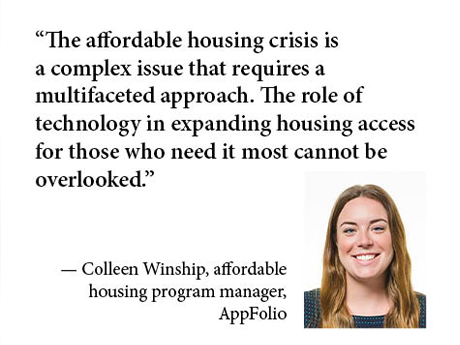There is an urgent need for more affordable housing in the United States. For every 100 extremely low-income renter households, there are just 36 affordable units available for rent, according to a March 2024 report from the National Low Income Housing Coalition (NLIHC).
Despite widespread attention on this issue — including at the state and federal levels — the supply shortage has continued. Municipalities across the United States continue to struggle to address symptoms of the affordable housing crisis, such as homelessness and rising housing costs. The NLIHC reports that there is a shortage of more than 7 million homes for the nation’s 10.8 million extremely low-income families.
The complexity of managing affordable housing has been a persistent roadblock for the sector.
Property managers must contend with numerous operational challenges, from navigating evolving compliance and regulatory requirements to operating on thin margins. Clunky back-end practices required for compliance often lead to inefficiency for property managers, while also creating lengthy application processes and waitlists for those in need of housing.
Operators are a critical part of creating housing stability and addressing the nationwide shortage of affordable housing. Most people in the affordable housing sector did not join the industry to spend so much of their time on admin work or complex processes. They did it to make a positive change. There’s nothing more frustrating than wanting to help people, but being overwhelmed by outdated technology, mountains of paperwork and systems that don’t work intuitively.
While the housing shortage can’t be solved overnight, these operational issues can be addressed at the technology level to benefit residents and affordable housing managers alike.
Operational Challenges Impact Turnover, Revenue
Affordable housing programs are often hindered by slow timelines.
A prospective tenant at a market-rate property can reasonably tour a unit and then sign the lease on the same day. At an affordable housing community, however, it can take weeks to navigate compliance standards. For example, the verification process to ensure that a potential new resident is qualified to live at an affordable housing community requires extensive and ongoing reporting.
These are high-stakes timelines. A report from AppFolio found that 22 percent of affordable housing renters have experienced delays of months or even years during the application process. In addition to leaving potential tenants without a place to live, this puts property owners in a position where they are not earning revenue on certain units for extended periods of time.
Hurdles and inefficiencies on the software side can further delay these processes. Everyday tasks such as qualifying and recertifying residents can become overwhelming for property managers when handled offline or logged across disparate systems.
With that in mind, it is unsurprising that affordable housing managers often struggle to streamline operations at their properties. In AppFolio’s 2023 State of Affordable Housing report, 75 percent of operators ranked operational efficiency as their greatest challenge.
Without the right technology to manage documentation, property managers waste time repeating work across various platforms, handling unnecessary admin tasks or correcting compliance errors. In the same survey, affordable housing managers reported spending a staggering 39 percent of the typical 40-hour week on “busywork.” Additionally, 60 percent of respondents agreed that they wish they had more time to focus on higher-value tasks.
Streamline Processes With the Right Technology
Technology issues can quickly become disruptive and time-consuming for operators. Conversely, however, implementing property management software that suits your community’s unique needs can make a major difference in operational efficiency. In fact, affordable housing managers say that 40 percent of a typical workweek can be optimized or streamlined with the right technology, according to AppFolio’s report.
Centralizing operations is an important step toward improving efficiency. For instance, operators are often stuck using different platforms to manage affordable and conventional units. Often, this means that teams must navigate disparate data sources, creating burdensome and time-consuming busywork. In this case, a single, cloud-based system to manage all operations may be more efficient.
Property management software has progressed rapidly and substantially since 2020. Particularly, there have been notable advances in artificial intelligence (AI) and automation technology.
Automated tools exist for common tasks such as data entry, tenant income certification, invoicing and work order management. This helps property managers to more effectively maintain compliance standards, manage overwhelming amounts of paperwork and cut down on frustrating admin tasks. Ultimately, it’s about freeing up more time to interact with residents and give back to the community.
Accessible, easy-to-use technology can also simplify the application process for potential tenants. The sheer volume of different requirements and programs can be overwhelming and confusing for residents, so anything that simplifies the process will make a substantial difference.
The affordable housing crisis is a complex issue that requires a multifaceted approach. The role of technology in expanding housing access for those who need it most cannot be overlooked.
It’s up to software providers to continue innovating in this space and creating solutions that are purpose-built for affordable housing and the sector’s unique challenges. Likewise, it’s up to property managers to use new technology strategically in order to speed up lead to lease timelines, manage compliance and ultimately help people to secure housing as seamlessly as possible.
Colleen Winship is the affordable housing program manager at AppFolio. Based in Santa Barbara, California, AppFolio provides property management technology to the real estate industry.


